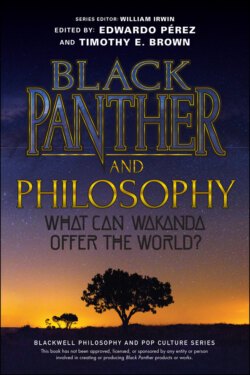Читать книгу Black Panther and Philosophy - Группа авторов - Страница 28
“How Do You Think Your Ancestors Got These?”
ОглавлениеMaybe we’re focused on the wrong sort of desert. Maybe we should consider retribution rather than restitution. The British took the mask like they took the axe and deserve punishment for it. Killmonger and Klaue aren’t repo men, they’re the executioners of retributive justice. (Well, not Klaue. He seems happy just as an agent of chaos.) “The world took everything away from me, everything I ever loved!” Killmonger declares in his righteous anger. “But I’mma make sure we’re even.” He’s not talking about restitutive justice here. He wants to punish the world.
Killmonger is not the only character in Black Panther for whom retribution as corrective justice resonates deeply. T’Challa goes to Korea to capture Klaue, bring him to Wakanda to stand trial, and complete his father’s unfinished work. Eager to apprehend his parents’ killer, W’Kabi asks to join in. When T’Challa gently refuses, W’Kabi makes his priorities clear: “Then I ask – you kill him where he stands or you bring him back to us.” T’Challa fails to do either, Killmonger arrives with Klaue’s body, and this sways W’Kabi to the usurper’s cause. “I am standing in your house, serving justice to a man who stole your vibranium and murdered your people,” Killmonger says. “Justice your king couldn’t deliver.”
Has justice been served? The philosopher Alec Walen identifies three core principles serving as the foundation of retributive justice:
1 those who commit certain kinds of wrongful acts, paradigmatically serious crimes, morally deserve to suffer a proportionate punishment;
2 it is intrinsically morally good – good without reference to any other goods that might arise – if some legitimate punisher gives them the punishment they deserve;
3 it is morally impermissible intentionally to punish the innocent or to inflict disproportionately large punishments on wrongdoers.7
Now consider: the stolen vibranium has not been returned, W’Kabi’s parents are still dead, and none of those directly or indirectly responsible for these things have done anything to compensate for that. But for Killmonger and W’Kabi (and no doubt many other Wakandans) what matters is that Klaue has been punished for his grievous crimes. The intrinsic good of retribution remains. If anyone deserves death as proportionate punishment for their wrongful acts, Klaue for his 1991 homicides (not to mention grand theft) is among them. Is Killmonger a “legitimate punisher” in this case? Most of the assembled Wakandan Council seem skeptical when he arrives with Klaue, but then they don’t know who he really is. (“That’s not my name princess. Ask me, king.”)
